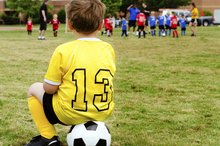Benefits of Growing Up in a Large Family
Large families bring benefits for the kids as well as the parents 2. The art of compromise, the ability to share with one another and self-reliance are among a few of the traits that children from large families possess. Large families are only as loving and cohesive as the parents make them, according to Vivian Diller, Ph.D., a New York City-based psychologist in the "Psychology Today" article, "The Benefits and Disadvantages of Large Versus Small Families. 2"
Side Effects Include
There is generally more competition in bigger families as the siblings want their own share of their parents' attention. The ability to get along and love one another at an early age is thought by many moms of multiple children to be a positive side effect of larger families, according to the article, "Family Size in America: Are Large Families Back?" published on the Baby Center website 1. Since there is always someone to play with, having siblings increases the ability to make friends, show empathy and accept responsibility, says Baby Center.
- There is generally more competition in bigger families as the siblings want their own share of their parents' attention.
- The ability to get along and love one another at an early age is thought by many moms of multiple children to be a positive side effect of larger families, according to the article, "Family Size in America: Are Large Families Back?"
Take One for the Team
Characteristics of a Healthy Family Relationship
Learn More
Children from large families often recognize the special place they have within their families. As they learn to work together as a team, the ability to do their share is strengthened, according to the article, "Bigger and Better," by Katherine Schlaerth, an associate professor emeritus at the USC School of Medicine and a practicing physician, published on the Los Angeles Times website 3. These children realize that being part of a larger family requires everyone to do their share; skipping out on their chores or responsibilities may have a ripple effect and disturb the brood.
- Children from large families often recognize the special place they have within their families.
- As they learn to work together as a team, the ability to do their share is strengthened, according to the article, "Bigger and Better," by Katherine Schlaerth, an associate professor emeritus at the USC School of Medicine and a practicing physician, published on the Los Angeles Times website 3.
Hand-Me-Downs
Generally, people think that they should have smaller families to keep the costs down. Larger families tend to use less, according to Schlaerth. Utilities such as electricity and heat will not increase in the same manner as your grocery bill. Clothing can be handed down from child to child until it wears out. Larger families may spend less on activities and entertainment by creating their own fun. For example, game night can be divided into teams or a day in the park can consist of sack races or kite-flying contests.
- Generally, people think that they should have smaller families to keep the costs down.
- For example, game night can be divided into teams or a day in the park can consist of sack races or kite-flying contests.
Siblings for Life
Activities That Teach Kids to Love Others
Learn More
Not every child from a large family is going to have a positive experience or feel that her needs were met. In large families with healthy connections, siblings bond and can become lifelong friends. As adults, they are there to support one another; there is generally a loyalty and trust that remains strong through the ups and downs of life, according to Schlaerth. Siblings will assist each other with everything from caring for their parents in old age to helping each other out with childcare. Extended family events carry the potential to increase those bonds further.
- Not every child from a large family is going to have a positive experience or feel that her needs were met.
- As adults, they are there to support one another; there is generally a loyalty and trust that remains strong through the ups and downs of life, according to Schlaerth.
Related Articles
References
- Baby Center: Family Size in America: Are Large Families Back?
- Psychology Today: The Benefits and Disadvantages of Large Versus Small Families
- Los Angeles Times: Bigger and Better
- Thomas PA, Liu H, Umberson D. Family relationships and well-being. Innov Aging. 2017;1(3):igx025. doi:10.1093/geroni/igx025
- Poutiainen H, Hakulinen-Virtanen T, Laatikainen T. Associations between family characteristics and public health nurses' concerns at children's health examinations. Scand J Caring Sci. 2014;28(2):225-34. doi:10.1111/scs.12035
- Defrain J. Asay S. Strong families around the world. Marriage & Family Review. 41(1-2):1-10. doi:10.1300/J002v41n01_01
Writer Bio
Karen Kleinschmidt has been writing since 2007. Her short stories and articles have appeared in "Grandma's Choice," "Treasure Box" and "Simple Joy." She has worked with children with ADHD, sensory issues and behavioral problems, as well as adults with chronic mental illness. Kleinschmidt holds a Bachelor of Arts in psychology from Montclair State University.









